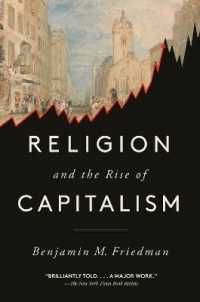- ホーム
- > 洋書
- > 英文書
- > Psychology
Full Description
The psychology of emotion is an extraordinarily broad enterprise, attracting interest from researchers in virtually every sub-discipline. This presents a formidable challenge to an editor selecting 75 papers to represent key contributions to the development of knowledge in the field. The five volumes that make up these Benchmark Papers are divided into a total of nine subsections. Section 1 focuses on theoretical contributions and on papers that examine cognitive approaches to emotion. Section 2 is concerned with social, cultural, and organizational psychology perspectives on emotion. The whole of Section 3 is devoted to physiological and neuroscience contributions to the literature. Section 4 covers developmental psychology, health psychology, and abnormal psychology.Covering the entire scope of the psychology of emotion, this collection contains benchmark readings with a combination of classic works and more recent key publications, and will be included as part of the SAGE Benchmarks in Psychology series. Volume 1 covers topics in emotion theory and cognitive approaches to studying emotionVolume 2 covers social, cultural, and organizational aspects of emotionVolume 3 covers physiological and neuroscience approaches to emotionVolume 4 covers developmental, health, and clinical approaches to emotionThis four-volume reference set will make an invaluable addition to any academic library with an interest in and/or existing collections in the psychology of emotion. It should provide an excellent supplement on courses in emotion where students need to engage with the theoretical views and empirical research that have made this field of inquiry so fascinating and a perfect reference work for researchers from any domain of emotional research.
Contents
Volume OneTheoretical and Cognitive Psychology PerspectivesPART ONE: EMOTION THEORYWhat Is an Emotion? - W JamesCognitive, Social and Physiological Determinants of Emotional State - S Schachter and J E SingerProgress on a Cognitive Motivational Relational Theory of Emotion - R S LazarusThe Laws of Emotion - N H FrijdAn Argument for Basic Emotions - P EkmanA Theory of Emotion, and Its Application to Understanding the Neural Basis of Emotion - E T RollsEmotion, Attention and the Startle Reflex - P J Lang, M M Bradley and B CuthbertThe Affect System Has Parallel and Integrative Processing Components - J T Cacioppo, W L Gardner and G G BerntsonForm Follows FunctionThe Role of Positive Emotions in Postive Psychology - B L FredricksonThe Broaden-and-Build Theory of Positive EmotionsPART TWO: COGNITION AND EMOTIONConcept of Emotion Viewed from a Prototype Perspective - B Fehr and J A RussellEmotion Knowledge - P Shaver et alFurther Exploration of a Prototype ApproachCore Affect, Prototypical Emotional Episodes and Other Things Called Emotion - J A Russell and L F BarrettDissecting the ElephantIf It Changes It Must Be a Process - S Folkman and R S LazarusStudy of Emotion and Coping during Three Stages of a College ExaminationPatterns of Cognitive Appraisal in Emotion - C A Smith and P C EllsworthStudying the Emotion-Antecedent Appraisal Process - K R SchererAn Expert-System ApproachAppraisal Determinants of Emotions - I J Roseman, A A Antoniou and P E JoseConstructing a More Accurate and Comprehensive TheoryAffect, Cognition and Awareness - S T Murphy and R B ZajoncAffective Priming with Optimal and Suboptimal Stimulus ExposuresMood, Misattribution and Judgments of Well-Being - N Schwarz and G L CloreInformative and Directive Functions of Affective StatesBeyond Valence - S J Lerner and D KeltnerToward a Model of Emotion-Specific Influences on Judgement and ChoiceVolume TwoSocial, Cultural and Organizational Psychology PerspectivesSocial Functions of Emotions at Four Levels of Analysis - D Keltner and J HaidtIs Empathic Emotion a Source of Altruistic Motivation? - C D Batson et alAre Shame, Guilt and Embarrassment Distinct Emotions? - J P Tangney et alThe Intelligence of Emotional Intelligence - J D Mayer and P SaloveyCoherence between Expressive and Experiential Systems in Emotion - E L Rosenberg and P EkmanSociality of Solitary Smiling - A J FridlundPotentiation by an Implicit AudienceCommunication of Affect through Facial Expressions in Humans - R W Buck et alBeyond the Emotional Event - B Rime et alSix Studies on the Social Sharing of EmotionGender Differences in Motives for Regulating Emotions - M Timmers, A H Fischer and A S R MansteadAntecedent- and Response-Focused Emotion Regulation - J J GrossDivergent Consequences for Experience, Expression and PhysiologyPART TWO: EMOTION AND CULTURECulture and the Categorization of Emotions - J A RussellCulture and the Self - H R Markus and S KitayamaImplications for Cognition, Emotion and MotivationConstants across Cultures in Face and Emotion - P Ekman and W V FriesenIs There Universal Recognition of Emotion from Facial Expression? A Review of the Cross-Cultural Studies - J A RussellEvidence for Universality and Cultural Variation of Differential Emotion Response Patterning - K R Scherer and H G WallbottThe Shifting Basis of Life Satisfaction Judgments across Cultures - E Suh et alEmotions versus NormsEmotion in the Workplace - B E Ashforth and R H HumphreyA ReappraisalEmployee Positive Emotion and Favorable Outcomes at the Workplace - B M Staw, R I Sutton and L H PelledEmotions and Leadership - J M GeorgeThe Role of Emotional IntelligenceVolume ThreePhysiological and Neuroscience Approaches to EmotionPART ONE: PERIPHERAL NERVOUS SYSTEM ACTIVITYElectromyographic Activity over Facial Muscle Regions Can Differentiate the Valence and Intensity of Affective Reactions - J T Cacioppo et alVoluntary Facial Action Generates Emotion-Specific Autonomic Nervous-System Activity - R W Levenson, P Ekman and W V FriesenThe Autonomic Differentiation of Emotions Revisited - G StemlerConvergent and Discriminant ValidationPART TWO: BRAIN CIRUITS AND EMOTIONBrain Systems That Mediate Both Emotion and Cognition - J A GrayEmotion Circuits in the Brain - J E LedouxEmotion, Plasticity, Context and Regulation - R J Davidson, D C Jackson and N H KalinPerspectives from Affective NeuroscienceRethinking Feelings - K N Ochsner et alAn fMRI Study of the Cognitive Regulation of EmotionPART THREE: THE AMYGDALAThe Contribution of the Amygdala to Normal and Abnormal Emotional States - J P AggletonA Differential Neural Response in the Human Amygdala to Fearful and Happy Facial Expressions - J S Morris et alImpaired Recognition of Emotion in Facial Expressions Following Bilateral Damage to the Human Amygdale - R Adolphs et alConscious and Unconscious Emotional Learning in the Human Amygdale - J S Morris, A [um]Ohman and R J DolanPART FOUR: THE ORBITO-FRONTAL CORTEXEmotion, Decision-Making and the Orbito-Frontal Cortex - A Bechara, H Damasio and A R DamasioThe Orbito-Frontal Cortex and Reward - E T RollsAbstract Reward and Punishment Representations in the Human Orbito-Frontal Cortex - J O'Doherty et alWhat Is the Role of Dopamine in Reward - K C Berridge and T E RobinsonHedonic Impact, Reward Learning or Incentive Salience?Neuroanatomical Correlates of Happiness, Sadness and Disgust - R D Lane et alSubcortical and Cortical Brain Activity during the Feeling of Self-Generated Emotions - A R Damasio et alFunctional Neuroanatomy of Emotion - K L Phan et alA Meta-Analysis of Emotion Activation Studies in PET and fMRIVolume FourDevelopmental, Health and Abnormal Psychology PerspectiveChildren's Knowledge of Emotion - P L Harris, T Olthof and M M TerwogtSocial Cognition, Pro-Social Behavior and Emotion in Pre-Schoolers - S A DenhamContextual ValidationYoung Children's Understanding of Other People's Feelings and Beliefs - J Dunn et alIndividual Differences and Their AntecedentsLearning Display Rules - C Z Malatesta and J M HavilandThe Socialization of Emotion Expression in InfancyEmergent Themes in the Study of Emotional Development and Emotion Regulation - J J Campos, R G Campos and K C BarrettEmotionality, Emotion Regulation and Pre-Schoolers' Social Adaptation - K H Rubin et alThe Relations of Emotionality and Regulation to Children's Anger-Related Reactions - N Eisenberg et alAttachment and Emotion Regulation during Mother-Teen Problem-Solving - R R Kobak et alA Control-Theory AnalysisEmotion and Aging - N Eisenberg, A Cumberland and T L SpinradJ J Gross et alExperience, Expression and ControlPART TWO: EMOTION AND PHYSICAL HEALTHCoping Theory and Research - R S LazarusPast, Present and FutureCoping with a Breast-Cancer Diagnosis - A L Stanton and P R SniderA Prospective StudyPersonality, Coping Style, Emotion and Cancer - L TemoshokTowards an Integrative ModelDisclosure of Traumas and Immune Function - J W Pennebaker, J K Kiecolt-Glaser and R GlaserHealth Implications for PsychotherapyEmotional States and Physical Health - P Salovey et alPART THREE: EMOTION AND PSYCHOLOGICAL HEALTHThe Autistic Child's Appraisal of Expressions of Emotion - R P HobsonSelective Processing of Threat Cues in Anxiety-States - A Mathews and C MacLeodFamily Factors in Schizophrenic Relapse - C E Vaughn et alReplication in California of British Research on Expressed EmotionPredictors of Relapse in Unipolar Depressives - J M Hooley and J D TeasdaleExpressed Emotion, Marital Distress and Perceived CriticismDysfunction in the Neural Circuitry of Emotion Regulation - R J Davidson, K M Putnam and C L LarsonA Possible Prelude to Violence






